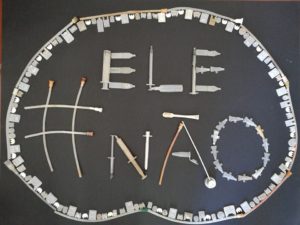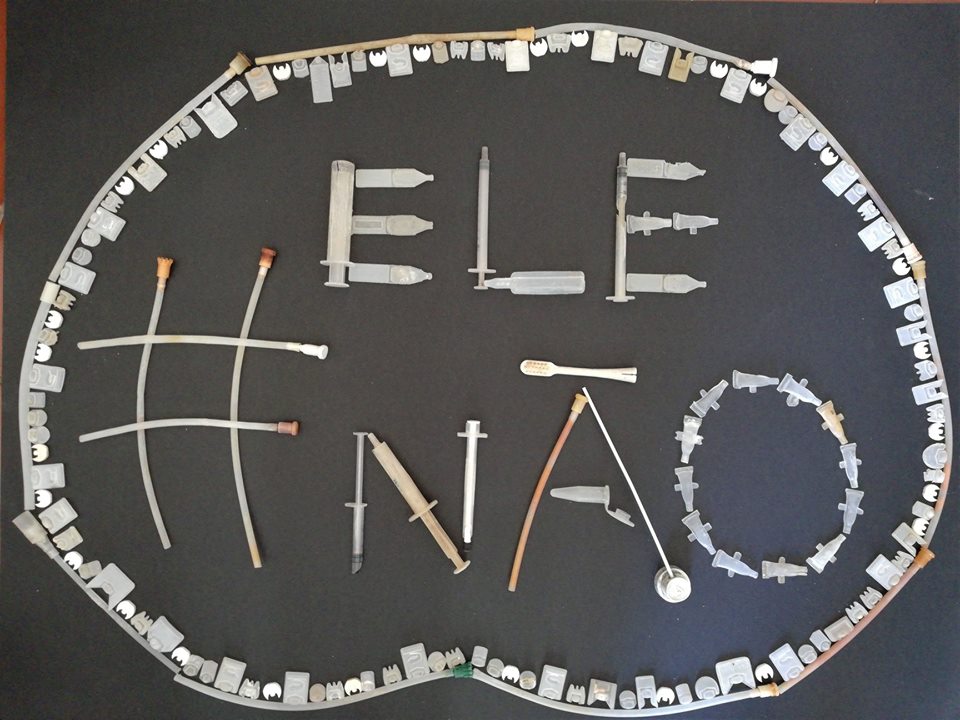Todo o Serviço de Saúde Pública Português tem realizado um trabalho de louvar. Falta unir esforços e ligar diferentes áreas em prol do bem comum, a saúde e o ambiente! E um dos inquestionáveis problemas é a falta de locais de recolha de agulhas e seringas usadas por diabéticos.

Figura 1: Objectos hospitalares encontrados na praia. Fotografia de Plasticus maritimus
Segundo o diretor do Agrupamento de Centros de Saúde de Aveiro, Pedro Almeida, “há uma norma [da Direção-Geral de Saúde] que refere que [as seringas e agulhas] são consideradas resíduos urbanos, cabe às pessoas terem cuidados”. “Aconselhamos as pessoas a colocarem esse material dentro de uma garrafa de 1,5 litros” acrescentou, explicando que “nas seringas mais recentes o perigo não é tanto, pois elas são retrácteis”.
Ainda assim, esta questão não diz respeito exclusivamente à saúde pública, ainda que seja esta a principal preocupação dos portugueses. Para onde irão estes materiais, uma vez que não são recolhidos nas farmácias nem têm qualquer outro destino específico?
A Quercus, durante o desenvolvimento de uma nova aplicação para telemóveis que tem como objetivo constituir um auxílio na hora de saber como reciclar, apercebeu-se desta problemática “Estas seringas [utilizadas por diabéticos] vão muitas vezes parar às nossas praias.”, afirmam, salientando que “já alertamos as entidades oficiais no sentido de encontrar uma resposta para esta situação”.
O Município de Ílhavo, cujas praias foram consideradas limpas no relatório do “Programa de Monitorização de Lixo Marinho em praias” (dezembro 2017), da Agência Portuguesa do Ambiente (APA), recolheu no ano passado, numa das atividades de monitorização dos resíduos presentes no areal e nas margens da Ria de Aveiro do projeto Coastwatch Europe, dirigida especificamente aos alunos que frequentam o primeiro ciclo do Ensino Básico no concelho, variadíssimos materiais entre os quais se encontravam algumas seringas e administradores de insulina.
É certo que grande parte do lixo que vem parar às praias portuguesas é arrastado pelas correntes marítimas e pelas ondas do mar, e é, por isso, proveniente de outros países. Mas não só, e por algum motivo o material utilizado no controlo da Diabetes está entre os resíduos mais frequentes encontrados nas campanhas de limpeza dos nossos areais.
Também em Viana do Castelo, em apenas quatro atividades de monitorização foram recolhidos mais de duzentos quilogramas de lixo nas suas praias. “Os resíduos vão desde vassouras a molas da roupa, peças de fogo-de-artifício, seringas, tampões auriculares, frascos para análises clínicas, cotonetes e fitas de identificação de hospitais”, revelou em outubro de 2018 o Centro de Monitorização e Interpretação Ambiental do município.
No caso concreto do material utilizado diariamente pelo mais de um milhão de diabéticos portugueses que em 2015 compraram nas farmácias portuguesas 1.431.962 frascos de insulina e 2.775.398 tiras de medição de glicémia (dados do “Relatório Anual do Observatório Nacional da Diabetes – Diabetes: Factos e Números”), considera-se um atentado ambiental, devido à composição destes materiais que depois de expostos ao sol e à água se podem tornar tóxicos e que, ao sofrerem decomposição, acabam muitas vezes comidos por animais marinhos, entrando na nossa cadeia alimentar.
Assim, a população aguarda por medidas urgentes por “quem de direito”, nomeadamente na disponibilização de locais onde possam ser entregues estes materiais de forma que não constituam um fator de risco nem ambiental, nem de saúde.
___________________
Used syringes and needles: Where are they going?
“Diabetes: Portugal has one of the best treatments in the world, however, there is a lack in prevention.”, claims the article published in the Diário de Notícias’s online page (a national magazine) on the 15th of February 2018. Exactly one year later, one must add that there’s a need to do this, without harming the planet!
The Portuguese Public Health Service has done an amazing work in different medical specialties. A connection between different areas of society and nature benefit, such as linking health and the environmental topics is missing! One of the unquestionable problems is the lack of collection sites of needles and syringes used by diabetics.
According to the director of the Group of Health Centres of Aveiro (Agrupamento de Centros de Saúde de Aveiro), Doctor Pedro Almeida, “there is one norm [of the Health National Directive] that mentions that syringes and needles [of diabetics] are considered urban waste, so the responsibility of the respective citizens.”. “We recommend people put these materials into a 1.5 litre bottle,” as the doctor added, explaining that “the latest syringes are not as dangerous as the previous ones, because they are retractable.”
Even so, this issue does not concern public health alone, although this is the main concern of Portuguese people. Where do these materials go after being used, if they cannot be collected in pharmacies nor do they have any other specific destination?
Quercus, while developing a new mobile app that aims to help people of all ages to know how to recycle, realized this problem, “These syringes often [used by diabetics] end up on our beaches. We’ve already alerted the official entities to find a solution for this problem, as soon as possible. This is a huge problem.”.
The municipality of Ílhavo, located on the central coast of Portugal, whose beaches were considered “clean” in the report “Programme for the Monitoring of Marine Litter in Beaches” (December 2017), of the Portuguese Environment Agency (APA)), last year collected many materials including some syringes and insulin administrators, in one of the monitorization activities of the residues present on the shore and on the banks of the Ria of Aveiro, of the project Coastwatch Europe, directed specifically to students who attend the elementary school in the municipality.
It is true that a great amount of the rubbish found on Portuguese beaches is dragged by ocean currents and sea waves, thus, from various countries. However, it is also from Portugal, and this may be confirmed by analysing the diabetes controlling products which are one of the most common waste found in cleaning campaigns on Portuguese beaches.
In Viana do Castelo, in the north coast of Portugal, in only four monitorization activities two hundred kilograms of garbage were collected on its beaches. “Brooms, clothes pegs, firework materials, syringes, ear plugs, clinical label bottles, swabs and hospital identification tapes are some examples of the things found in these campaigns.”, stated the municipality’s Environmental Monitoring and Interpretation Centre, in October 2018.
In the topic of the materials used on a daily basis by more than one million Portuguese diabetics that bought in 2015 1,431,962 insulin bottles and 2,775,398 glucose measurement strips in Portuguese Pharmacies (data from the National Diabetes Observatory Annual Report – Diabetes: Facts and Numbers), it is considered an environmental attack, due to the composition of these materials that after exposition to the sun and water can become toxic and that during decomposition are sometimes eaten by marine animals, entering mankind’s food chain.
Therefore, Portuguese citizens are waiting for urgent measures from the government, with regards to the availability of sites where they can dispose of these materials in a way that they do not constitute an environmental or health a risk factor.




You must be logged in to post a comment.